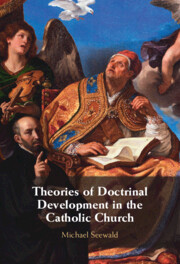8 results

Theories of Doctrinal Development in the Catholic Church
-
- Published online:
- 18 February 2023
- Print publication:
- 23 March 2023
Chapter 8 - Creation and Miracles in the Guide
- from Part IV - The Created
-
-
- Book:
- Maimonides' <I>Guide of the Perplexed</I>
- Published online:
- 18 June 2021
- Print publication:
- 01 July 2021, pp 143-160
-
- Chapter
- Export citation
5 - Conscience in the Early Church Fathers
- from Part II - Conscience According to Major Figures and Traditions
-
-
- Book:
- Christianity and the Laws of Conscience
- Published online:
- 12 June 2021
- Print publication:
- 24 June 2021, pp 93-111
-
- Chapter
- Export citation
4 - Sensus Fidei, the Magisterium, and the Formation of Conscience
- from Part I - Themes in Understandings of Conscience in Christianity
-
-
- Book:
- Christianity and the Laws of Conscience
- Published online:
- 12 June 2021
- Print publication:
- 24 June 2021, pp 71-90
-
- Chapter
- Export citation
Chapter 2 - Dynamic Modalities and Teleological Agency
-
-
- Book:
- Productive Knowledge in Ancient Philosophy
- Published online:
- 14 January 2021
- Print publication:
- 04 February 2021, pp 39-61
-
- Chapter
- Export citation
13 - Leadership and Governance in the Church
- from Part II - Conciliar Themes and Reception
-
-
- Book:
- The Cambridge Companion to Vatican II
- Published online:
- 14 May 2020
- Print publication:
- 28 May 2020, pp 232-247
-
- Chapter
- Export citation
Chapter 11 - On the Citizen and Church-State Relations
-
-
- Book:
- Hobbes's <I>On the Citizen</I>
- Published online:
- 15 November 2019
- Print publication:
- 05 December 2019, pp 199-216
-
- Chapter
- Export citation



